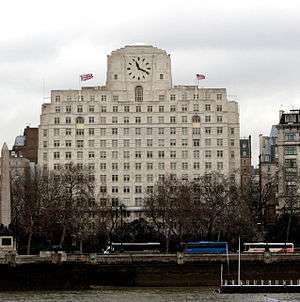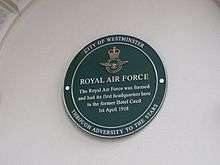Shell Mex House
Shell Mex House, also known as 80 Strand,[1] is a grade II listed building located at number 80 Strand in London, England.[2] The building was opened in 1932 on the site of the Hotel Cecil and stands behind the original facade of the hotel, between the Adelphi building and the Savoy Hotel. Broadly Art Deco in style, it was designed by Frances Milton Cashmore of the architectural firm of Messrs Joseph.

Description
Standing 58 m (190 ft) tall, with 537,000 sq ft (49,900 m2) of floor space, Shell Mex House has 12 floors (plus basement and sub-basement) and is immediately recognizable from the River Thames and the South Bank by the clock positioned on the south side of the building (flanked by two large, hieratic figures at the south corners in marble by the sculptor William Charles Holland King). The clock, which was known for a time as "Big Benzene", has the biggest clock face in the UK, at 7.62 metres in diameter, just 0.02 metres more than the clocks on the Liver Building in Liverpool; it was supplied by Gillett & Johnston of Croydon. The building faces the river and the Strand. It was described by architectural historian Nikolaus Pevsner as "thoroughly unsubtle, but...hold[s] its own in London's river front."
History
The building was for many years the London headquarters of Shell-Mex and BP, for which it was originally built. Shell-Mex and BP was a joint venture company created by Shell and British Petroleum in 1932, when they decided to merge their United Kingdom marketing operations.[3] Upon the UK marketing separation of Shell and BP in 1976, Shell Mex House became the head office of Shell UK, which was Shell's UK operating company. Changes in the way that Shell was run in the 1990s led to the disposal of the property by Shell. Today, simply known as 80 Strand, most of its floors are occupied by companies belonging to Pearson plc.

The entrance of the building, which is set back from the Strand, is through a large gated archway. A green plaque was affixed to the wall just inside the gate in March 2008, proclaiming: "The Royal Air Force was formed and had its first headquarters here in the former Hotel Cecil 1st April 1918". Below it is a brass plate stating: "This plaque was unveiled by the Chief of the Air Staff Air Chief Marshal Sir Glenn Torpy KCB CBE DSO ADC to mark the 90th anniversary of the formation of the Royal Air Force".[4]
During World War II, the building became home to the Ministry of Supply, which co-ordinated the supply of equipment to the national armed forces. It was also the home of the "Petroleum Board", which handled the distribution and rationing of petroleum products during the war. It was badly damaged by a bomb in 1940.
The building reverted to Shell-Mex and BP on 1 July 1948, with a number of floors remaining occupied by the Ministry of Aviation (latterly the Board of Trade, Civil Aviation Division) until the mid-1970s. During this time, until the department's move to the present location in Farnborough, the building was also the headquarters for the Air Accidents Investigation Branch.[5]
On 17 May 2006, The Times reported[6] that the building was for sale and that the Indian-Kenyan Kandhari family was the front-runner in the battle to buy it from the existing owners, Vincent and Robert Tchenguiz. The Kandharis were said to have offered £530 million for the building, but they were competing with other interested groups, including Menorah, the Israeli insurer, an Irish company, and several British companies. An offer believed to be for £520 million ($1.02 billion) was made in December 2006 by Istithmar, the investment agency of the Dubai government, which withdrew its offer before completion. The property was subsequently sold in July 2007 to a fund managed by Westbrook Partners.
In popular culture
In the final scene of the 2016 feature film Assassin's Creed, directed by Justin Kurzel, the hero Callum Lynch and two other surviving assassins stand astride Shell Mex House and survey London.
See also
References
- Eighty Strand website
- "Shell Mex House – Westminster". britishlistedbuildings.co.uk.
- Reference and contact details: GB 1566 SMBP Title:Shell-Mex and BP Archive Dates of Creation: 1900–1975 Held at: BP Archive GB 1566 SMBP
- News. "Westminster Green plaque marks RAF's first HQ". webarchive.nationalarchives.gov.uk. Archived from the original on 3 May 2010. Retrieved 25 October 2017.CS1 maint: BOT: original-url status unknown (link)
- Final report (Archive) Swiss Federal Department of Transport and Power - Translated by the Department of Trade Accidents Investigation Branch. p. 3. Retrieved on 12 May 2012. "Accidents Investigation Branch Department of Trade Shell Mex House Strand, London WC2R 0DP"
- The Times, Business, 17 May 2006, p. 63
External links
| Wikimedia Commons has media related to Shell Mex House. |